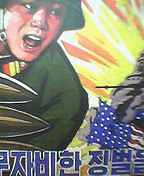Wednesday, June 29, 2005
A quick note to Nick on being a guest in America (via Derrida)
Derrida's approach to ethics and politics: the unique obligation that each of us has to the other.
"But pure or unconditional hospitality does not consist in such an invation ('I invite you, I welcome you into my home, on the condition that you adapt to the laws and norms of my territory, according to my language, tradition, memory, and so on'). Pure and uncoditional hospitality, hospitality itself, opens or is in advance open to someone who is neither expected nor invited, to whomever arrives as an absolutely foreign visitor, as a new arrival, nonidentifiable and unforeseeable, in short, wholly other."
Quoted from Philosphy in a Time of Terror - Dialogues with Habermas and Derrida
"But pure or unconditional hospitality does not consist in such an invation ('I invite you, I welcome you into my home, on the condition that you adapt to the laws and norms of my territory, according to my language, tradition, memory, and so on'). Pure and uncoditional hospitality, hospitality itself, opens or is in advance open to someone who is neither expected nor invited, to whomever arrives as an absolutely foreign visitor, as a new arrival, nonidentifiable and unforeseeable, in short, wholly other."
Quoted from Philosphy in a Time of Terror - Dialogues with Habermas and Derrida
Democracy: obverse, reverse

Today, they announced some portentious revisions for the design of the 'Freedom Tower' in NYC (I've blogged about this metaphysical accident waiting to happen before here). It is of interest to note that Norman O. Brown (Nobby) in his book Love's Body reminds us that architecturally speaking, domes represent egalitarian political ideas and that towers represent totalitarian ones. At least America's new form of superlatively reverse democracy prevents this new Babelesque structure from also being the world's tallest oxymoron.
Sunday, June 26, 2005
'Genuine' wisdom
English + blog + lots of readers = not many Japanese people have
Friday, June 24, 2005
Like nothing else
Nick, in a recent entry on CO, wrote the following.
>The last shows a new SUV, the Hummer. It's huge,
>battleship grey, and has tiny windows. It looks like
>nothing so much as a tank. It strikes me that it's the
>wintry polar opposite of the AMC Pacer, the 70s American
> compact car which resembled a futuristic bubble of glass,
> open to the world around it. "You don't need to see out
> of me," the 2005 Hummer seems to say, "just crush
>everything in your path".
My current research at Tokyo U of Art has me spending a lot of time reading about various modes of transportation, especially in relation to war. So something that I read recently came to mind...it might be of interest to note something that Paul Virilio wrote back in 1977 in his book "Speed and Politics" on the type of military vehicles that pre-dated the hummer. I'll quote at lenght from the chapter "Essay on Dromology":
Speed is the hope of the West; it is speed that supports the armies' morale. What "makes war convenient" is transportation, and the armored car, able to go over every kind of terrain, erases the obstacles. With it, earth no longer exists. Rather than calling it an "all-terrain" vehicle, they should call it "sans-terrain"--it climbs embankments, runs over trees, paddles through the mud, rips out shrubs and pieces of wall on its way, breaks down doors. It escapes the old linear trajectory of the road or the railway. It offers a whole new geometry to speed, to violence. It is already no longer simple an auto-mobile, but also a projectile and a launcher, while waiting to become a radio transmitter as well; it hurls both projectiles and itself. With it, once more, Death kills Death, since it victoriously opposes the fearsome German machine gun. Captain de Poix has a prophetic vision of a battlefield literally covered by the mass of these automotive forces. After leaving the street, the military proletariat loses contact with the road. From now on, anything can become a probably trajectory of its Assult. The battlefield has become like the naval glacis, without obstacles, entirely run by the rapid engines, the "battleships of the earth."
And it might be useful to borrow his phrase "the military proletariat" and, with a twist, update it to cover the need to have such a vehicle as one's personal mode of transportation: The "consumptively militarized American proletariat"
A CO reader commented on Nick's post:
>but the new hummers are just fascimiles, hummer-shaped cars that have all
>the gas-milage disadvantages of a regular hummer without being able to
>survive a missile blast.
In an act of nationwide psychological denial, the citizens of America who might purchace such a vehicle, living in a country that has recenty secured its "position" as a "possessor" of Iraqi oil in an effort to be in a pole position at the onset of the coming energy/oil crisis, have decided to splurge...to forget. If America as the prodigal son returns to his senses, can the fatted calf of this kind of consumerism be slain?
And echoes of this can be found in the most unlikely places. In the upscale Setagaya ward, Tokyo Japan, there is, in total, what amounts to a small fleet of these vehicles being driven on roads almost too narrow for two normal cars to comfortably pass each other, by nouveau riche Japanese, in an embarrassing effort to flaunt their ability to spend their disposable income on the raw excess of spatial redundancy, an indulgance which is, regrettably, its very own raison d'etre. The only way that this socio-economic class can find to express itself in the backdrop of a country in which space is at a premium is to rebel against the tendancy of hyper-miniaturization, and consciously select hyper-maximization.
Hummer. As the webpage states, it is "Like nothing else"...at least we can thank Allah for that singularity!
News Flash
Ai senselessly pounded
Thursday, June 23, 2005
New reads

Philosophy in a Time of Terror Dialogues with Jurgen Habermas and Jacques Derrida by Giovanna Borradori
EVIL EYE
JUCHE
Friday, June 17, 2005
What's on my mind today?
Tsuyu: Non-eschatological Percipitation and Umbrellic Karma
Tuesday, June 7, 2005
For the folks out there that didn't think "nipples"
You know WHO winds up sounding a lot this week on his blog like a character in a novel by Rudyard Kipling...or even better, John Buchan!
Sunday, June 5, 2005
The fundamental things apply as time goes by
Of course, everyone knows that when girls don't say "no" they really don't mean "yes"! How simple could you get?
Friday, June 3, 2005
Do we have to start this all over again?
Thursday, June 2, 2005
DANCER IN THE DARK (REDUX)
Interesting observations about Korean/Japanese govt. sanctioned art exhibitions by a man in the know:
Regardless of the end result, one must ask why the organizer would seek ethnic purity in their curatorial voice. And while I don't know that there is any one answer, there are a lot of theories. Currently, North Korea is run under the philosophy of Juche, or Korean self-sufficiency based on Confucianism, and some say that South Korea is beginning to come under the influence of this philosophy! Since 2002 or so, some observers mention that there has been a strong rise in a "go it alone" attitude in South Korea. Some people point to Korea's strong showing in the FIFA World Cup which it co-hosted with Japan and the visually strong "We Are the Reds" fan movements or the North-South rapprochement. Other still point to the leftist nationalist Uri Party (literally translated into English as: Our Party) coming to power in the Korean Parliament. Then some mention the rise of anti-Americanism mentioned in chapter 2. And it is important to note that others still mention the aggravating visits of the Japanese Prime Minister to the Yasukuni Shrine and disputes with Japan over the naming of the Sea that lies between them, possession of a particular little islet, and the content of Japanese schools' history textbooks as instigating factors of the present trend.
Independence is laudable and it can have its definite curatorial benifits, but active trends towards exclusivity and ethno-nationalist purity have worrying underpinnings and potential consequences in an age of global interactivity and conflict. As a significant chunk of Japanese officially sanctioned cultural discourse has sought to creat Japanese space for Asians to be Asians in Asia, its Korean counterpart seeks Korean space for Koreans to imprint a Korean image on a global world. Like the artworks reviewed in the previous chapter, Japanese exhibitions' attempts at regional integration that are conceptually moving towards a more global/universal context stand side-by-side with Korean exhibitions' attempts to globalize its cultural discourse coloured by an increasing trend towards nationalism...
- From Dancing at the End of Pax Americana, Tyler Russell (2004 Grad thesis at Tokyo University of Arts)


